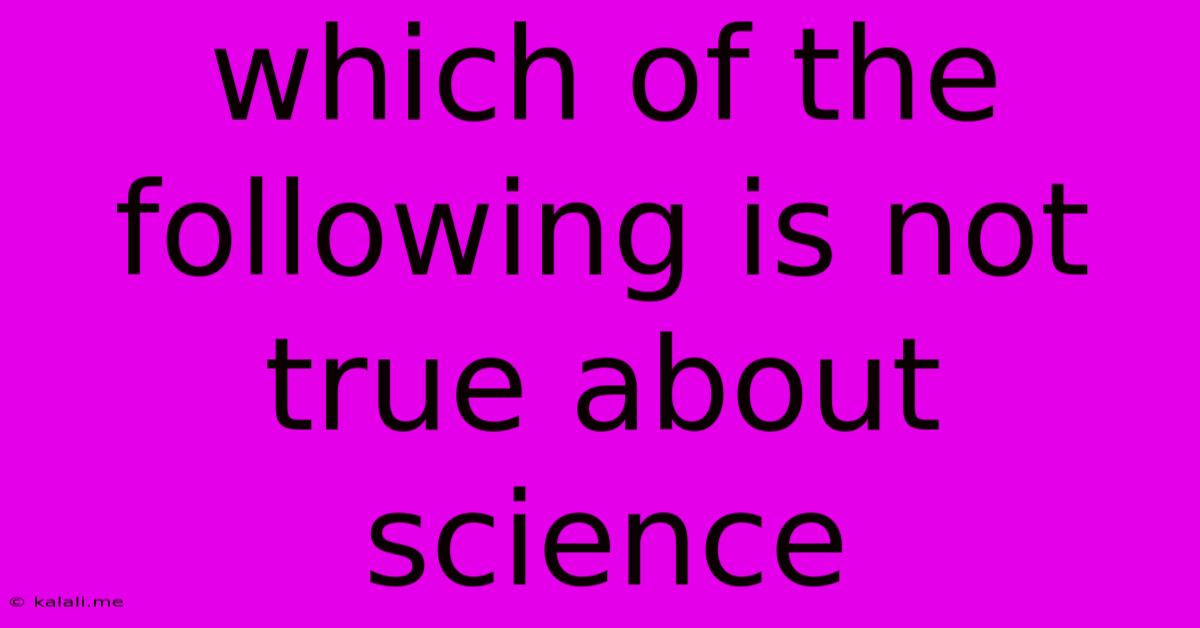Which Of The Following Is Not True About Science
Kalali
Jun 15, 2025 · 3 min read

Table of Contents
Which of the Following is NOT True About Science? Debunking Common Misconceptions
Science is a powerful tool for understanding the world around us, but many misconceptions surround its nature and process. This article clarifies some common misunderstandings by exploring what is not true about science. Understanding these misconceptions is crucial for appreciating the strength and limitations of scientific inquiry.
What this article covers: We'll examine several statements often mistakenly attributed to science and explain why they are inaccurate. This will help you better understand the scientific method, its limitations, and the crucial role it plays in shaping our knowledge.
1. Science Provides Absolute Truth and Certainty
FALSE. A common misunderstanding is that science reveals absolute, unchanging truths. In reality, scientific knowledge is constantly evolving. Scientific theories are the best explanations we have based on currently available evidence, but they are always subject to revision or even replacement as new evidence emerges. Science is a process of continuous refinement, not a quest for ultimate, unwavering certainty. Think of it as a constantly improving map, not a perfectly accurate photograph. Newtonian physics, for example, was later refined and extended by Einstein's theory of relativity, which didn't invalidate Newtonian physics but expanded upon it.
2. Science is a Linear, Step-by-Step Process
FALSE. The popular image of the scientific method as a rigid, linear sequence (observation, hypothesis, experiment, conclusion) is an oversimplification. Scientific inquiry is often messy, iterative, and non-linear. Scientists may revisit earlier steps, pursue unexpected leads, and adjust their approaches based on new findings. Collaboration, creativity, and serendipity play significant roles in scientific breakthroughs. The process is more accurately described as a cyclical and collaborative exploration.
3. Scientific Findings are Always Objective and Unbiased
FALSE. While scientists strive for objectivity, human biases can influence the research process, from the selection of research questions to the interpretation of results. Funding sources, personal beliefs, and societal pressures can all inadvertently shape scientific investigations. Peer review, replication of studies, and rigorous methodological scrutiny help to mitigate these biases, but eliminating them completely is practically impossible. Acknowledging the potential for bias is crucial for critical evaluation of scientific claims.
4. Science Explains Everything
FALSE. Science is incredibly powerful but has limitations. It primarily addresses questions about the natural world that can be tested empirically, through observation and experimentation. Science cannot answer questions of value, ethics, or aesthetics. It cannot definitively address matters of faith or belief, which lie outside the realm of empirical investigation. While science can inform ethical decision-making, it cannot dictate moral choices.
5. Science is Always Done Correctly and Ethically
FALSE. Sadly, the history of science is punctuated by instances of misconduct, including fraud, plagiarism, and unethical experimentation. Stringent ethical guidelines and oversight mechanisms are in place to prevent and address such issues, but they are not foolproof. It's crucial to critically evaluate the sources and methodologies of scientific findings, considering potential ethical conflicts of interest.
In conclusion, while science is an incredibly effective tool for understanding our world, it's essential to understand its limitations and the inherent complexities of the scientific process. Recognizing what isn't true about science allows for a more nuanced and informed appreciation of its strengths and its crucial role in building our knowledge.
Latest Posts
Latest Posts
-
Match Each Threat To Internal Validity To The Appropriate Description
Jun 16, 2025
-
Is A Speaker An Input Device
Jun 16, 2025
-
Sound Travels Fastest In Which Medium
Jun 16, 2025
-
2 Elements That Are Liquid At Room Temperature
Jun 16, 2025
-
What Is The Greatest Angle Measure In The Diagram
Jun 16, 2025
Related Post
Thank you for visiting our website which covers about Which Of The Following Is Not True About Science . We hope the information provided has been useful to you. Feel free to contact us if you have any questions or need further assistance. See you next time and don't miss to bookmark.